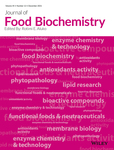Effects of aqueous extract of Medicago denticulata against paracetamol-induced hepatotoxicity in rabbits
Funding information
No direct funding was received for this work. However, the facilities used were from project No. 2344 of kindly supported by the Higher Education Commission of Pakistan is highly appreciated.
Abstract
Medicago denticulata is commonly used as a leafy vegetable, salad, and food ingredient. In this study, different doses of leaves aqueous extract of M. denticulata (MD) were fed to intoxicated rabbits with paracetamol (100, 200, and 300 mg/kg) for regular 21 days. The aqueous extract was evaluated for phenolic composition using HPLC-DAD. Serum biochemical and hematological parameters were studied to check its activity. The liver was examined histologically and for antioxidant status. Results revealed that paracetamol led to a significant alteration in all the hematological (RBC, WBC, Hb, PLT, and HCT), and serum lipid parameters (TC, HDL, LDL, and TG) while MD at the dose rate of 300 mg/kg had a curative effect on the stabilization of the affected parameters. The high dose of MD ameliorated different antioxidant parameters such as reduced glutathione (GSH), DPPH radical scavenging activity (RSA), and thiobarbituric acid reactive substances (TBARS) of the liver on day 21st of the treatment. Histological studies revealed significant paracetamol-induced toxicity of the liver, whereas the MD had positive effects on induced toxicity. Improvement in all these alterations confirms the curative potential of Medicago denticulata extract.
Practical applications
Paracetamol is a well-known antipyretic and analgesic medicine. However, it has been found to cause toxicity including hepatotoxicity. Synthetic drugs such as statins, antibiotics, and anti-viral are used for curing hepatic diseases also cause severe side effects. Thus, nutraceuticals from plant foods are used to reduce the side effects of different hepatotoxic medicine are continuously researched. This study reported for the first time that aqueous extract of the plant leaves was protective against the hepatotoxicity induced by paracetamol.
CONFLICT OF INTEREST
The authors declare that the research was conducted in the absence of any commercial or financial relationships that could be construed as a potential conflict of interest.
Open Research
DATA AVAILABILITY STATEMENT
Data will be available upon request to the corresponding author.




